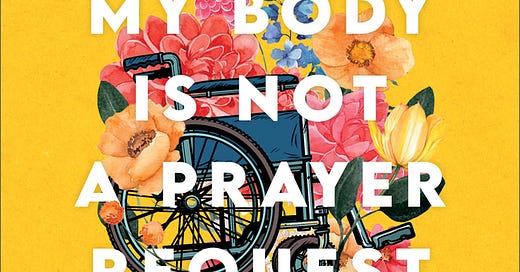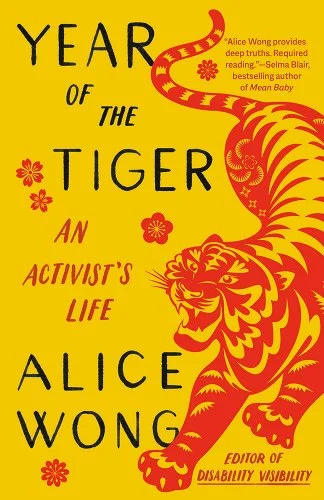Credit where credit is due
Two disabled thinkers who live in the back of my mind as I unpack ability, disability, capitalism, and all the things
These last few weeks, I’ve been reflecting on how a good portion of my March through May got devoured by a mystery intermittent-but-totally-awful stabbing leg pain.
It made me think a lot about:
Learning to ask for what I need and extend grace toward my unreliable body
Reframing things in ways that work for us (and not in ways that don’t)—and learning to see the creativity in the ways (and others) we adapt to our realities
I want to back up a bit, though. Experience has been my teacher, these last few months. But it has not been my only teacher.
I want to acknowledge and appreciate a couple writers whose work on disability has been living in the background of my brain as I’ve been reflecting and writing. I’d love to share with you all a few things that stand out to me from their work.
First, Amy Kenny’s book My Body Is Not a Prayer Request: Disability Justice in the Church.
As you can probably tell from the title, this book is situated in a Christian context. (Although Alice Wong, who I’ll say more about in a minute, does tell a mind-boggling story about an evangelical revival where people prayed for her and then pulled her out of her wheelchair, bursting into wild applause when she took a couple steps with someone holding her hand—which she had been able to do anyway, no miracles required, but nobody cared to ask her about that.)
Anyhow. A thought that stood out to me from My Body Is Not a Prayer Request:
“We need to disentangle ourselves from any system that claims there is a hierarchy of bodies and minds. We already have a context for this in the rest of creation…There are sixty thousand types of trees, three thousand varieties of tulips, and four hundred kinds of sharks. No one claims fringed tulips are better or worse than cup-shaped tulips. They are both beautiful in their distinctiveness.
We need to start thinking about bodies in the same way we think about tulips. No body is better or worse than another body because it is fringed or cupped. Variety isn’t just the spice of life; it sustains life. Variation allows organisms to survive. Instead of eradicating difference, we should celebrate it” (16-17).

As someone who greatly enjoys the annual Skagit Valley Tulip Festival, I love Amy Kenny’s tulip analogy. Until I visited the festival for the first time last year, I hadn’t exactly registered just how frickin’ many different kinds of tulips live in our world.
And seriously. They’re all so cool in their own cool ways. Each one gorgeous. No hierarchy needed.
I think about this when I think about the fragility and unreliability of my own body, these last few months. The mystery stabbing leg pain is a difficulty of living in this particular body-mind.* There are also wonderful things about living in this body-mind.
It isn’t better or worse than any other, just different. Like tulips.
(Also, bonus points in my book for a metaphor that gives us something other than hardcore bro-y Calvinism to think about when we think about a tulip.)
Here’s another insight from Amy Kenny that I appreciated. She’s speaking of herself and other disabled people:
“Our lives, our body-minds puncture the illusion of ‘normalcy’ and invite us to dismantle the idols of prosperity, productivity, and independence. Disabled people bear an unfair burden for what is true about all of humanity; temporarily nondisabled people just don’t realize it yet. Our bodies are not self-sufficient. We cannot rely solely on ourselves. We must become interdependent to thrive. We must learn to promote disability justice to help restore coflourishing among humanity” (59).
That feels right to me. Because really, what is normal? And what is this collective delusion of independence?
All of humanity, as Kenny says, only flourishes through interdependence. We only flourish through building the kinds of communities where we all know that we all thrive together, or not at all.
Self-sufficiency is an illusion. No matter how solitary or self-sustaining we might feel ourselves to be, we are all tied together in complicated ways every single day. If nothing else, I’m connected to the people who built the roads I drive on, who designed the car I’m driving, who grew and transported the food I buy from the grocery store.
The phrase “temporarily nondisabled” also stuck out to me. I hadn’t quite thought about it in this way until relatively recently, but it’s so true. If we’re lucky enough to reach old age—and often even if we’re not—then some sort of disability is inevitable at some point in our lives.
This may feel sobering. But I hope it’s also a helpful encouragement to intentionally build the kinds of interdependent networks we all need in order to flourish, and to do that now.
The second book that lives in my mind as I reflect and write is Year of the Tiger: An Activist’s Life, by Alice Wong (
).This book is a collection of essays, doodles, and other pieces of writing and art. Wong has so many good things to say in so many different areas of life and justice and advocacy.
I wanted to share this quote from Wong’s thinking about diversity in general, which includes disability:
“The conversation on diversity needs to expand in several ways: first by including people with disabilities and other marginalized groups and acknowledging their cultural contributions, and secondly by conceptualizing diversity as disrupting institutions, practices, and structures rather than the symbolic inclusion and hiring of diverse people” (229).
Diversity not as symbolic inclusion but as disrupting institutions. That feels right.
I feel the pull of spaces I’ve been in where those in power want a diverse-looking team photo that makes them look and feel good.
But are they really ready for what full, respectful engagement with these diverse faces and voices might mean? Are they ready to be challenged, and to change?
Sometimes, I think, the answer is a clear no.
Other times, perhaps, people in power think the answer is yes—they have good intentions—but it isn’t, really. At least not enough, or not in a way that feels genuine and real to the diverse people who are now included in theory but find themselves crashing against so many unseen barriers when they try to actually give honest feedback or suggest change.
I also appreciated this quote from Alice Wong:
“One of the biggest things that’s so toxic about ableism and capitalism is this idea that our worth is based on our productivity…We know there’s more to our worth than just whether we’re taxpayers or whether we can work forty or more hours a week, and there are so many lessons to learn. We need to think about being more fluid and taking more risks, in terms of how we structure our daily lives, building in more accountability and really listening to those who are most impacted.
And let all those people who are most impacted, from every marginalized community, be at the center of finding the solutions and making decisions. Because, frankly, when you’ve been harmed by systems and institutions for your entire life or maybe just recently, you know how to figure things out” (336).
Exactly that. We would all be well served to listen, really listen, to the people who have had to figure things out. And by making that crucial connection between ableism and capitalism.
I’ve felt this—so much so—over the last few months with the leg pain issue, and also really anytime anything at all (oh hi, COVID) has slowed me down from working as much as I want to, or as much as I know I could work under different circumstances.
Sometimes these times of forced slowing down help me more fully make that critical separation between my worth and my productivity. Sometimes, it’s just frustrating. So frustrating.
But Wong is right. There is more to our worth. We have to know this—not just when we’re sick or injured or grieving or otherwise slowed down, but all the time. I want us to know this, together.
I hope you enjoyed these insights from two very cool humans and maybe learned something with me along the way.
Clearly I’m not terribly far along this journey of thinking through ableism and all the things, and I have no doubt there are other amazing thinkers I’d benefit from hearing from. Are there books or other resources you’d recommend? I’d love to hear.
Thanks for being here for the journey.
*“Body-mind” is a term I see in both Wong and Kenny’s work, along with other disability writers and advocates. And I like it, because isn’t everything connected?





